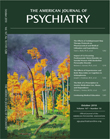Effect of Acute Psychological Stress on Prefrontal GABA Concentration Determined by Proton Magnetic Resonance Spectroscopy
Abstract
Objective:
Impaired function of the central gamma-aminobutyric acid (GABA) system, which provides the brain's major inhibitory pathways, is thought to play an important role in the pathophysiology of anxiety disorders. The effect of acute psychological stress on the human GABA-ergic system is still unknown, however. The purpose of this study was to determine the effect of acute stress on prefrontal GABA levels.
Method:
A recently developed noninvasive magnetic resonance spectroscopy method was used to measure changes in the GABA concentration of the prefrontal cortex in 10 healthy human subjects during a threat-of-shock condition and during a safe condition (two sessions on different days). The main outcome measure was the mean GABA concentration within a 3×3×2-cm3 voxel selected from the medial prefrontal cortex.
Results:
Prefrontal GABA decreased by approximately 18% in the threat-of-shock condition relative to the safe condition. This reduction was specific to GABA, since the concentrations of N-acetyl-aspartate, choline-containing compounds, and glutamate/glutamine levels obtained in the same spectra did not change significantly.
Conclusions:
This result appeared compatible with evidence from preclinical studies in rodents, which showed rapid presynaptic down-regulation of GABA-ergic neurotransmission in response to acute psychological stress. The molecular mechanism and functional significance of this reduced inhibitory effect of acute psychological stress in relation to impaired GABA-ergic function in anxiety disorders merit further investigation.



